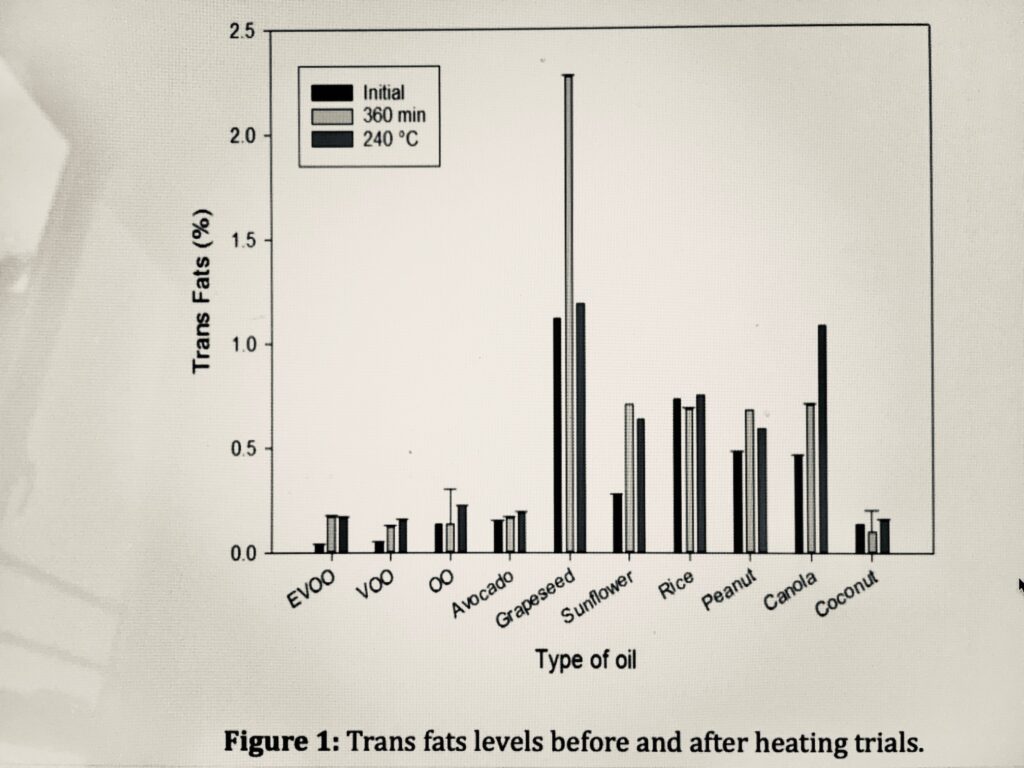
An ingredient that can lead to a lot of confusion!
We are told or heard that olive oil should not be heated, should be eaten raw etc. On the the other side, you may hear olive oil can be used in pan frying and other methods of cooking that involves heat. This can often be confusing as a consumer. Also, how does one choose a good olive oil?
Let’s look at what the research suggests: ( summarising the studies here, references below). Thanks to my colleague Dr. Antonella Ruiz for highlighting the studies.
When compared with other oils, EVOO ( extra virgin olive oil )was the least in the category to transform into transfats that are inflammatory.
There was no correlation with smoking point and oxidative stress. EVOO was most stable when heated.
Although at high temperatures there was some loss of phenolic compounds ( nutrient that promotes health), the researchers concluded that the amount of polyphenolic compounds in the EVOO was high enough to provide health benefits. So, frying is not a concern.
Another interesting fact noticed was, when sauted with ingredients as in a sofrito a meditarennean style of cooking, there was nutrient exchange that happened with the ingredients. In addition, they found that the availability of polyphenols were higher overall in this dish as in Sofrito due to the exchange.
Trans fat levels before and after heating trials (F 2018 ) (PREDIMED trial for cardiovascular health)

Conclusions:
Extra virgin olive oil is a key component of the Mediterranean diet and can be used for all types of cooking. It can be used raw, to pan fry, sauté, roast and even bake. However, we cannot use this data to confirm if can be used for deep frying. Cost is another concern with deep frying.
Always choose extra virgin olive oil as this is the highest grade oil and what has been used in studies and traditionally within the Mediterranean eating pattern.
Extra virgin means that the olives have been pressed very close to harvest without exposure to excess heat and the resulting oil is of high nutritional quality. To be sure you’re purchasing extra virgin olive oil, look for the following:
● The label clearly says Extra Virgin Olive Oil
● It’s stored in a dark glass bottle (this helps protect the oil from light and prevent degradation)
● A harvest date within the past 18-24 months. Olive oil is harvested in the late fall, so if you’re purchasing in 2023, you’d want a harvest date from Nov/Dec 2022, ideally.
● Look for a seal (if possible):
○ California: COOC seal
○ Europe: Protected Origin of Destination
○ International: International Olive Council (IOC) or Extra Virgin Alliance (EVA)
Unlike wine (and people), olive oil does not get better with age! Once it’s opened, light, heat and oxygen will begin to oxidize it, so you want to use it in your regular cooking versus keeping it for special occasions. Once a bottle is opened, it is best to use the oil within 3 – 6 months. Store oil in a cool, dark cabinet or pantry.
References:
Carvalho, A. G. A. de, Olmo-García, L., Gaspar, B. R. A., Carrasco-Pancorbo, A., Castelo-Branco, V. N., & Torres, A. G. (2022). Evolution of the metabolic profile of virgin olive oil during deep-frying: Assessing the transfer of bioactive compounds to the fried food. Food Chemistry, 380, 132205. https://doi.org/10.1016/j.foodchem.2022.132205
Estruch, R., Ros, E., Salas-Salvadó, J., Covas, M.-I., Corella, D., Arós, F., … Investigators, P. S. (2018). Primary Prevention of Cardiovascular Disease with a Mediterranean Diet Supplemented with Extra-Virgin Olive Oil or Nuts. New England Journal of Medicine, 378(25), e34. https://doi.org/10.1056/nejmoa1800389
F, de A., C, G., & L., R. (2018). Evaluation of Chemical and Physical Changes in Different Commercial Oils during Heating. Retrieved September 28, 2022, from Evaluation of Chemical and Physical Changes in Different Commercial Oils during Heating website: https://actascientific.com/ASNH/pdf/ASNH-02-0083.pdf
Jacka, F. N., O’Neil, A., Opie, R., Itsiopoulos, C., Cotton, S., Mohebbi, M., … Berk, M. (2017). A randomised controlled trial of dietary improvement for adults with major depression (the ‘SMILES’ trial). BMC Medicine, 15(1), 23. https://doi.org/10.1186/s12916-017-0791-y
Lozano-Castellón, J., Vallverdú-Queralt, A., Alvarenga, J. F. R. de, Illán, M., Torrado-Prat, X., & Lamuela-Raventós, R. M. (2020). Domestic Sautéing with EVOO: Change in the Phenolic Profile. Antioxidants, 9(1), 77. https://doi.org/10.3390/antiox9010077


